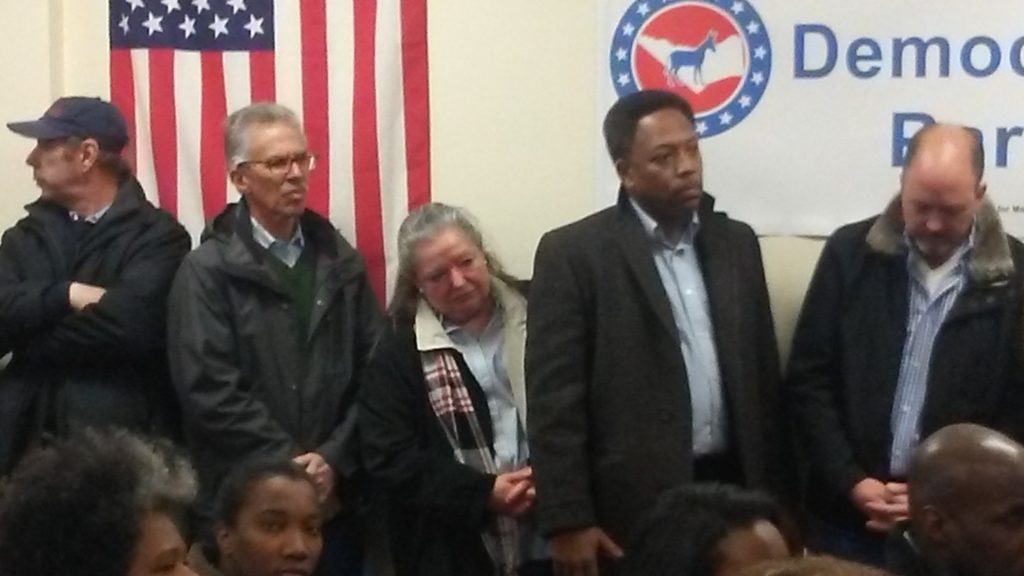Notes and Details about Marijuana Legalization Bills from Front Office Meeting with NJ Mayors

New Jersey Urban Mayors Association Meeting with Governor’s Office on Marijuana Legislation
Tuesday, March 19th, 2019
9:00 AM – 10:30 AM
Attendance
1. The Honorable Derek Armstead, Mayor, City of Linden
2. Mike DeLamater, Director of Intergovernmental Affairs, Office of the Governor
3. The Honorable Christine Dansereau, Mayor, Borough of Roselle, Central Vice President of the New Jersey Urban Mayors Association
4. Parimal Garg, Deputy Chief Counsel, Office of the Governor
5. Derrick Green, Senior Adviser for Diversity and Urban Affairs, Office of the Governor
6. The Honorable Ted Green, Mayor, City of East Orange
7. Ishiya A. Hayes, Fellow, New Jersey Urban Mayors Association, The John S. Watson Institute for Public Policy of Thomas Edison State University
8. Barbara George Johnson, Executive Director, The John S. Watson Institute for Public Policy of Thomas Edison State University
9. The Honorable Albert Kelly, Mayor, City of Bridgeton, President of the New Jersey Urban Mayors Association
10. Shoshanna Page, Senior Policy Advisor and Communications Strategist, on behalf of The Honorable Ras Baraka, Mayor, City of Newark
11. Brandon Parrish, Aide to the Governor, Intergovernmental Affairs, Office of the Governor
The following attended the meeting via phone:
12. Steeve Augustin, Confidential Aide, on behalf of The Honorable Dahlia Vertreese, Mayor, City of Hillside
13. The Honorable James Cahill, Mayor, City of New Brunswick
14. The Honorable Frank Gilliam, Mayor, City of Atlantic City
15. The Honorable John Moor, Mayor, Asbury Park
16. The Honorable Martin Nock, Mayor, City of Willingboro
17. The Honorable Rebecca Perrone, Deputy Mayor, City of Willingboro
18. The Honorable Carol Rizzo, Mayor, City of Neptune Township
19. The Honorable Michael Santiago, Mayor, City of Millville
20. Kabili Tayari, Director of Economic Development, on behalf of Mayor Steve Fulop, City of Jersey City
21. The Honorable Jesse Tweedle, Mayor, City of Pleasantville
Meeting Notes
I. The Governor’s Office stated that the following are included in the marijuana legislation:
A. Expungement
i. Marijuana offenses up to 5 lbs. will be expunged by the Superior Court, this system will be established 9 months after the law’s effective date.
There is no time limit for expungement.
The filing fee for expungement is waived.
First tier is expedited expungement in which residents apply to Superior Court to get their records expunged.
Second tier of expungement is virtual expungement.
ii. The Administrative Office will establish an e-file for deletion of records.
iii. Funding to support expedited expungement will come from the state, not cities.
iv. Specific language is in the bill to vacate sentences of currently incarcerated individuals, those on parole or probation.
v. Financial penalties will be implemented for companies who fail to hire based on marijuana convictions.
B. Taxes, Licenses, and Municipal Opt-In/Opt-Out
vi. There is a $42/ounce state tax.
vii. Municipal tax (authorized in law to be collected by municipalities) for those who opt-in.
Cities can implement 1% tax (from wholesalers), 2% tax (from growers and processors), or 3% tax (from cannabis retailers in their jurisdiction) and spend as they see fit.
viii. Municipalities have 180 days to opt-out of participation
The next opportunity to opt-out after the 180-day period is in the 5th year.
ix. A Commission will be created to determine the number of licenses.
3 seats will be designated by Governor, 1 by recommendation of Senate President, and 1 by recommendation of the Speaker.
x. Provisions are in the bill to protect from big industry takeover.
xi. 35% of licenses will go to people who make less than $200,000 a year.
xii. Separate bill addresses medical marijuana.
II. Considerations and Concerns of the New Jersey Urban Mayors Association
A. Expungement
i. NJUMA is calling for automatic expungement.
Technology should be put in place for records to merge with the AOC system for automatic expungement.
A process should be established where state police are mandated (within a stated timeframe) to release records to Administrative Court for expungement.
ii. Current bill amendments call for expedited expungement, which should include that non-violent marijuana offenders are considered a protected class under Civil Rights law for purposes of expungement.
iii. Virtual expungement is symbolic and is not supported by the NJUMA.
Discriminatory practices will prevail regarding employment (records are kept for 7 years) and housing.
Residents need a clear process for reporting discriminatory practices; state should track how many calls/complaints are being made – similar to the EEOC process.
Strict penalties for businesses that discriminate.
iv. Gaps on job applications from incarcerated period or criminal record may increase discriminatory practices.
State should provide a process to help ex-offenders navigate job search.
Social services should be provided to support in the creation and maintenance of livable wage/real jobs for ex-offenders.
The Court should offer a summary proceeding for discrimination filing, and if discrimination is found resident should be made whole through employment by the business.
Language should be included in the bill that supports owner/ex-offender partnership incentives.
v. Additional staff is needed for local courts and AOC to deal with expungement filing.
vi. Protection for youth in the illegal market.
B. Taxes and Licenses
i. NJUMA supports the collection of local taxes by municipalities (some municipalities will need to create a system for collection).
ii. Illegal marijuana market will boom by offering lower prices (in response to $42/ounce state tax).
iii. Licenses should go back to state of NJ so there is no turnover once a business closes (unlike what is done with alcohol licenses in urban communities).
iv. Mayors should be included on the Commission.
Next Steps:
i. The Governor’s Office will let the New Jersey Urban Mayors Association know what concerns will and will not be included in the bill by Friday March, 22, 2019.
Governor’s Office will identify which office or agency in government will oversee discrimination claims.
ii. The NJUMA membership will aid Governor’s Office in designing and implementing an expungement process.










Leave a Reply